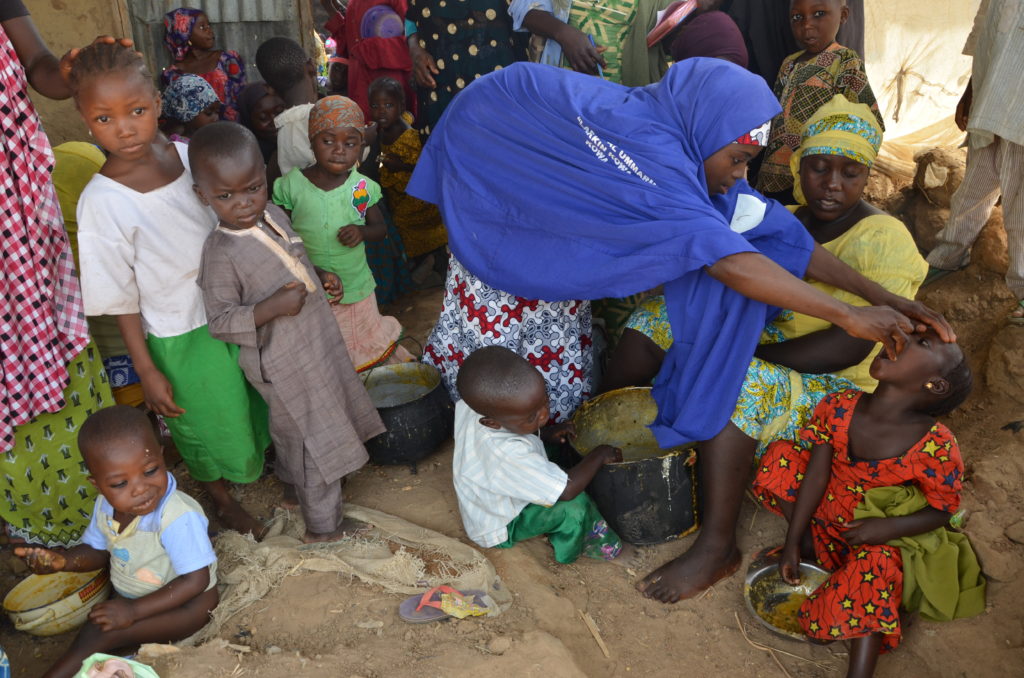
Equipping every frontline worker to utilize every opportunity to vaccinate a child in the remaning polio-endemic countries has become a key strategic approach during and between polio campaigns. Vaccinators are trained in inter-personal communication approaches to ensure they skillfully engage caregivers at the doorstep, while increasingly, social mobilizers are being equipped with vaccine to identify and subsequently immunize those children missed during campaigns.
In Nigeria, 21,000 UNICEF and CORE-supported Volunteer Community Mobilizers (VCMs) in the highest-risk northern states work between immunisation campaigns to register and refer pregnant women for antenatal care, conduct birth registration, promote routine immunization and provide life-saving messaging on handwashing with soap, exclusive breastfeeding, the prevention and treatment of diarrhoea, and screening of malnutrition.
These services build trust with mothers in the community, allowing the mobilizers to attend the popular traditional naming ceremonies of newborn children. Over the past year, social mobilizers have vaccinated approximately 4 million children under 5 at these ceremonies and CMAM (community management of acute malnutrition) sites. An additional 350,000 children identified from non-compliant households have been tracked and vaccinated between campaigns by the VCM network since February 2015, and of the 1 million newborn children tracked by mobilizers in the past year, a further 930,000 received their first vaccination by these trusted mobilizers.
In Afghanistan, nearly 7,000 full-time social mobilizers and supervisors are the face of the polio programme in urban areas and instrumental in building trust and demand for vaccination in their communities. Prior to campaigns, female mobilizers hold women’s courtyard sessions where women in the community gather to drink tea, and information is shared on the importance of vaccination against all vaccine-preventable diseases, exclusive breastfeeding and handwashing practices. During campaigns, these mobilizers are entrusted with tracking missed children due to absence or parental refusal and ensuring they are covered in the ensuing week. On average, 65% of children missed during campaigns due to absence and 30% of children missed due to refusal are vaccinated by mobilizers in their districts between campaigns.
In Pakistan, more than 14,000 full-time Community-Based Vaccinators work throughout the month to reach every child in their area with vaccine, and generate demand for routine immunization. Known as ‘Sehat Muhafiz’, or ‘Protectors of Health’, these part-vaccinators, part-social mobilizers are drawn from the communities in which they work, and are supported by community engagement and mass media strategies highlighting their critical role as health workers. These full-time Sehat Muhafiz are critical to the global eradication effort, targeting more than 2.8 million children under 5 in 417 Union Councils (UCs) in the highest-risk core reservoirs. The results have been strong: since the launch of the CBV model, the proportion of children missed in the highest-risk areas during national campaigns has fallen from 25% in 2014 to 5% in 2017 and 94% of areas are passed by independent monitoring. And the Data Support Centre database shows that CBV’s cover 90% of children missed during campaigns in the following week.
A joint WHO-UNICEF training curriculum is being rolled out to ensure vaccinators have strong inter-personal communication skills, with more than 46,500 vaccinators in Afghanistan and 2,500 Area-in-Charges in Pakistan trained to date. Annual KAP studies conducted by Harvard Opinion Research Polling underline this investment in vaccinators. In Pakistan, 74% of caregivers stated that vaccinators are better in 2017 than they were last year, with 70% of respondents saying vaccinators were “very knowledgeable about children’s health” (up from 52% in 2016).
These examples of social mobilization approaches are rooted in social data, with strategies driven by outcomes of community-based studies evaluating people’s perceptions about diseases and the benefits of vaccination. Such social data also helps inform development of broader community microplans, all in efforts to ensure that indeed, no child is left behind.



